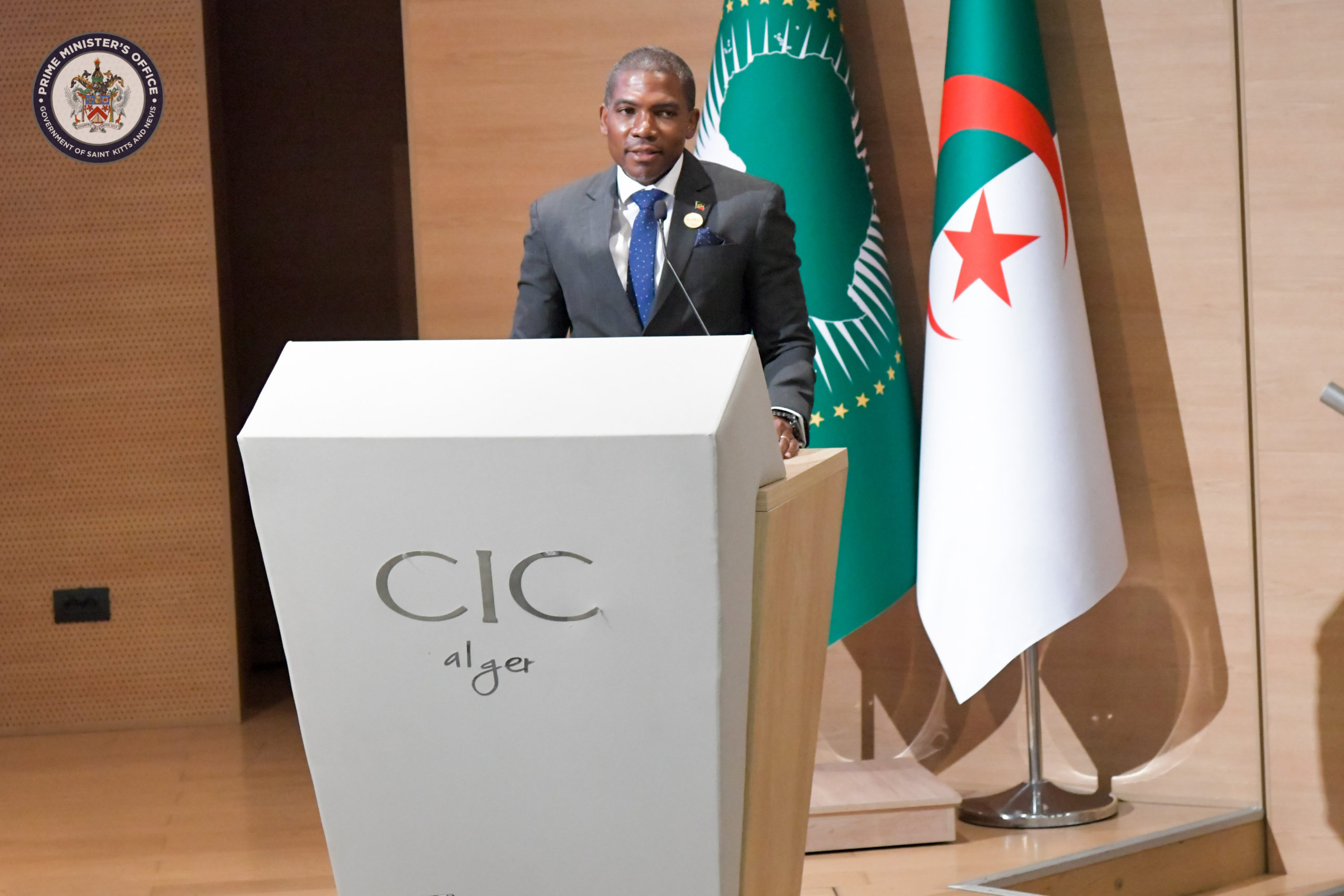Prime Minister Drew Declares Economic Sovereignty as the Next Chapter for a Global Africa
The clarion call for African economic sovereignty and the unstoppable rise of a unified “Global Africa” resonated powerfully from the Intra-African Trade Fair in Algiers, where Prime Minister Terrance Drew of St. Kitts and Nevis delivered a compelling address. Speaking on Global Africa Diaspora Day, Prime Minister Drew joined Caribbean counterparts Mia Amor Mottley of Barbados and Dickon Mitchell of Grenada in emphasizing the historical interconnectedness of Africa and its diaspora and the imperative for collaborative economic advancement. His address framed the contemporary pursuit of economic liberation as the latest chapter in a long and arduous journey, tracing its roots back to the struggles against slavery and colonialism.
Prime Minister Drew’s speech underscored the profound historical ties binding Africa and the Caribbean diaspora. He invoked the potent legacy of Marcus Garvey, whose rallying cry of “Africa for Africans” encapsulated the enduring aspiration for self-determination. He further highlighted the Caribbean’s pivotal role in Africa’s liberation movements, emphasizing the active participation of Caribbean figures in shaping the 1945 Pan-African Congress in Manchester. This pivotal event, attended by luminaries such as Kwame Nkrumah, Jomo Kenyatta, and W.E.B. Du Bois, laid the groundwork for the decolonization movements that swept across Africa in the following decades. The Prime Minister’s invocation of historical figures like Toussaint Louverture of Haiti served to underscore the Caribbean’s intellectual and activist contributions to the Pan-Africanist movement.
The Prime Minister’s address transitioned from historical reflection to a call for present action, urging a shift in focus from political liberation to economic sovereignty. He argued that the previous stages of the Pan-African project – fighting slavery, colonialism, and for political independence – have laid the foundation for this new phase, where economic self-determination takes center stage. This pursuit of economic sovereignty, he argued, is not merely an aspiration for Africa and its diaspora, but a vital step towards the upliftment of all humanity. He emphasized the interconnectedness of global progress, asserting that the advancement of Africa is intrinsically linked to the betterment of the world as a whole.
Prime Minister Drew’s vision for Global Africa extended beyond abstract ideals, emphasizing tangible outcomes such as increased trade and investment, the flourishing of African cultures, and the alleviation of poverty. He stressed the importance of intra-African cooperation and the resolution of internal conflicts, recognizing that unity within Africa and its diaspora is paramount to achieving these goals. He conveyed a sense of unwavering momentum towards this vision, describing the movement toward a unified Global Africa as an unstoppable force, a train that has already left the station.
The Prime Minister’s address served as a powerful reminder of the shared history and intertwined destinies of Africa and its diaspora. By framing the current pursuit of economic empowerment within the broader historical narrative of Pan-Africanism, he contextualized the ongoing struggle and underscored its significance. This historical framing served not only to inspire but also to provide a roadmap for future action, highlighting the importance of unity, self-reliance, and a focus on tangible economic and social progress. The call for economic sovereignty, presented as the next logical step in the Pan-Africanist journey, offered a powerful and compelling vision for the future.
The Algiers address ultimately served as a powerful articulation of the contemporary Pan-Africanist vision. It was a call for unity, self-determination, and a concerted effort to achieve economic prosperity for all people of African descent. By grounding the present struggle in the historical context of the Pan-African movement, Prime Minister Drew provided a compelling narrative of resilience, progress, and the unwavering pursuit of a shared future. His message resonated with the urgency of the present moment, emphasizing the need for immediate action while simultaneously instilling a sense of hope and optimism for the future of Global Africa.
Share this content:












Post Comment